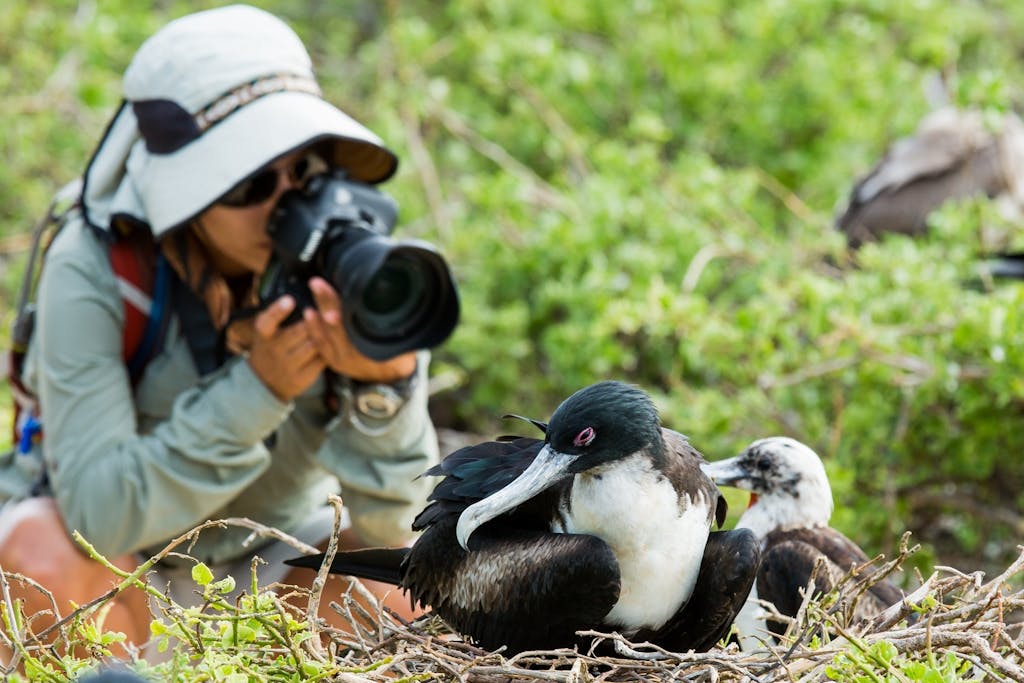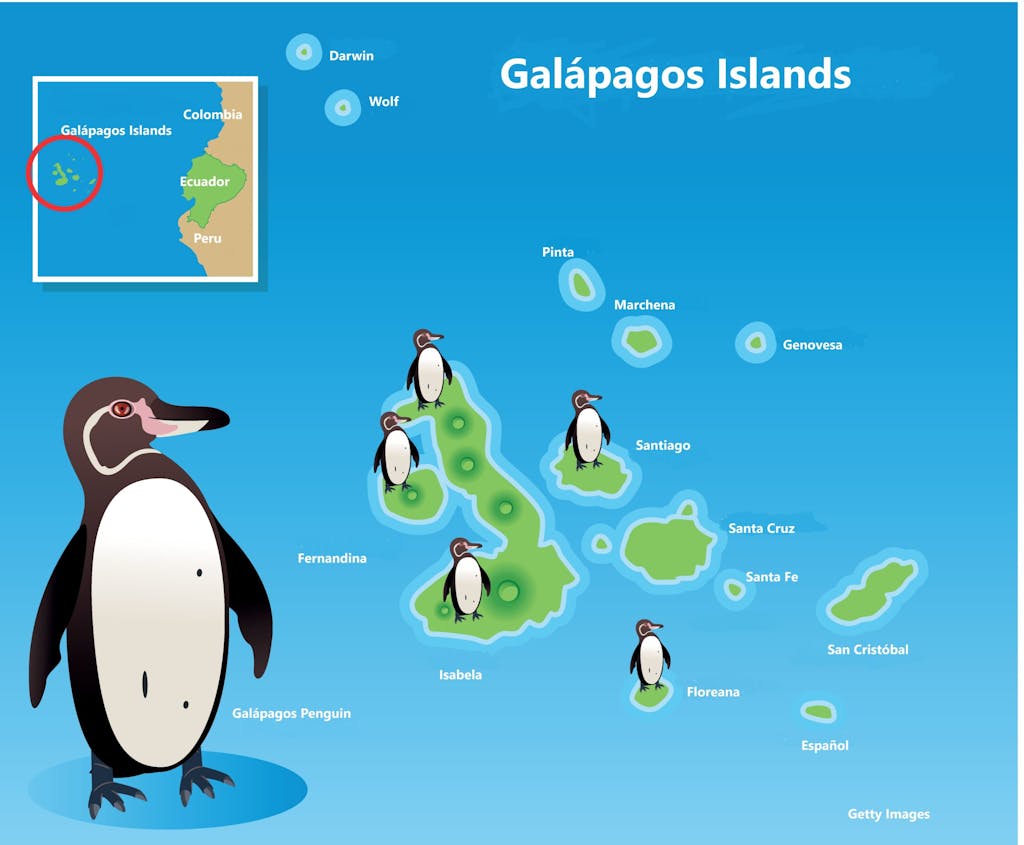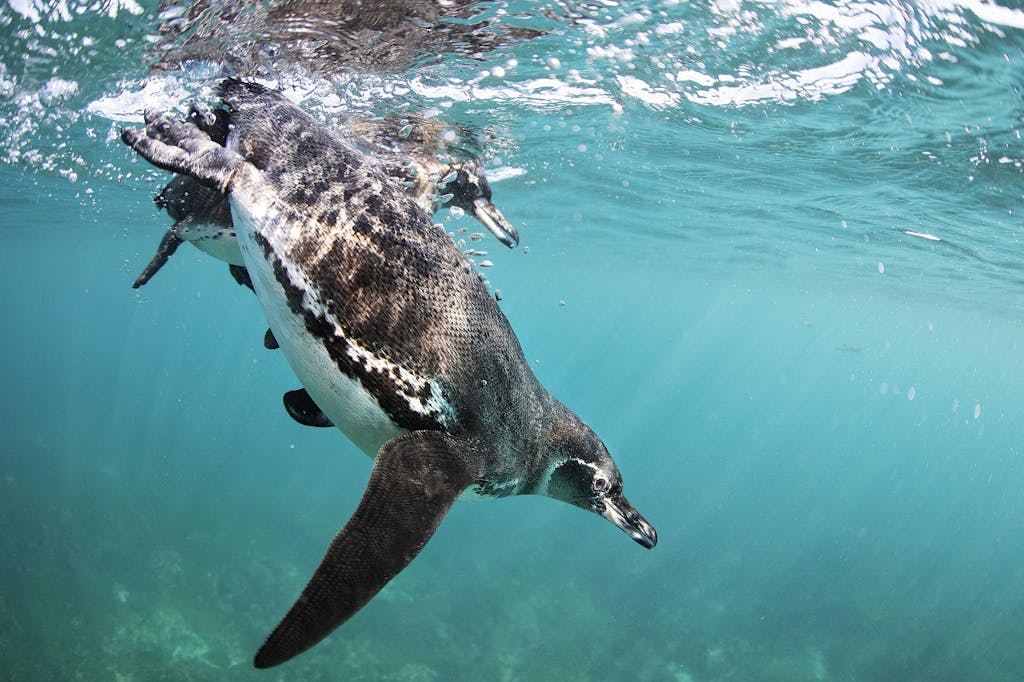Aura Banda’s Galápagos Islands: Protecting the Natural World Is a Family Tradition
Painted to look like a Canon SLR, Aura Banda’s first camera was a piece of wood cut by her grandfather on Floreana Island in the Galápagos. It was there, on this small archipelago off Ecuador, where she first dreamed of depicting the fragility of nature through images and of inspiring travelers of the Galápagos’ uniqueness.
As a third-generation resident of the remote archipelago, she was raised to be a steward of the islands. Banda pursued this mission by studying photographic arts, French and Italian, and environmental management. In 2005, she returned home to the Galápagos Islands and began her work as a naturalist guide and photo instructor. At Silversea, she has since been promoted to the position of expedition and development manager.

Banda’s growing legacy begins with her grandfather’s decision to become one of the first settlers of the Galápagos. “It wasn’t easy at the time,” Banda says of her grandparents’ experience in the late 1930s. There was no airport, and there were no airplanes; the only interaction with mainland Ecuador was a ship that came about once every six months.
Her grandfather returned to the mainland to get married. It was immediately clear to his new wife, however, that his heart lived in the Galápagos Islands, so they returned there together. Her grandfather began learning about living with the surrounding environment, using natural medicine and other ways of surviving in a uniquely remote place.
In honor of Earth Day, Silversea honors the efforts of Galápagos’ resident Aura Banda who inspires new generations to focus on sustainability of the islands.
“We need to give the children of the Galápagos access to knowledge, because, as Jacques Cousteau said, ‘People protect what they love.’ And to love and care, you must understand the place where you live.” –Aura Banda, expedition and development manager, Silversea, Galápagos.
Her grandfather’s philosophy: “We don’t have to make nature get used to us; we have to get used to nature.” This doctrine of conscious symbiosis was passed down to his children, who eventually bestowed it on Banda. Formal education beyond this worldview came when Banda’s grandmother spoke to the president of Ecuador to establish the first school on Floreana Island. But after children turned 12, they headed to the mainland to continue their education. And most of them would stay there.
The magnetic pull of the Galápagos
Her mother was one of those who stayed. She eventually married a man from the mainland and raised Banda and her siblings there in the Ecuadorian capital. But, like her grandfather, Banda felt called to the Galápagos Islands while growing up in the city.

“It was difficult,” she recalls, “because my cousins were growing up and having fun in the Galápagos while we were in Catholic schools in the city. Even though we would vacation there, we were city children.” But the urban influence can reach only so far when pitted against the siren song of the Galápagos, so when Banda’s youngest brother finished school, their mother returned home.
Banda, unable to resist the same pull to which her relatives had succumbed, also now calls the Galápagos home. For her, the islands are a familial place. “It was where my roots were,” she explains. That association was amplified by the juxtaposition of growing up in Quito.
“When I went to Floreana [Island], I loved how dark it is at night. You can see the stars,” she recalls, noting that in the city, she was too busy watching her back at night to take the time to look up. The wildlife of the Galápagos also captured her heart. “Darwin finches will come and be curious about you,” she says. “You can observe animal behavior without them feeling threatened. Most places you have to be at a bigger distance. Being able to be so close makes you feel like part of the whole thing.”
Banda’s passion for her ancestral homeland has grown. While growing up, she and her family had to take various boats to get to Floreana, but now there are two airports with multiple daily flights to the Galápagos. There’s also electricity where once there was only a generator and candles.
“Life is a bit easier now because we have more cargo, more facilities and the Internet,” Banda acknowledges. “But in another way, how many people can the island sustain? It’s starting to be a bit crowded.”
Protecting what she loves

The presence of more people has created a greater need for proactive stewardship, and that’s where Banda puts her passion for photography and the natural world to good use. In her previous roles as a naturalist guide and expedition leader with Silversea, and recently as an iGalápagos research assistant for the Center for EcosystemSentinels, she’s able to focus on the identification of Galápagos Penguins, the world’s only penguin species north of the equator, albeit just barely.
Her involvement began when the world’s foremost Galápagos Penguin specialist needed help gathering photos of the species. Banda goes twice a month to the birds’ main nesting sites.
“I thought, ‘What if I kept track for a whole year?” she says. “The logistics are expensive for them, but for me, it was while I was working. I was able to put the things I love together.” And now, she has been gathering photos for years with the help of Silversea guests.

Banda continues to fundraise for nature projects, including the eradication of rats, which remains the most significant threat to the unique species of the Galápagos.
She also is working on numerous other projects for the coming years, including a library for children who will need to learn how to use one, and other plans that will be announced later this spring.
“Galápagos wildlife is what I like to call ecologically naive –they evolved in an ecosystem with low competition,” she says. “Introducing goats, rats, pigs, dogs and cats broke the balance. Our endemic species stand no chance against the introduced ones.”

That’s one reason Banda became involved with a Silversea fund for the Galápagos. The program invites Silversea guests to join conservation efforts for the Galápagos, addressing not only environmental problems but also youth empowerment.
